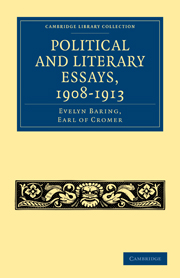Book contents
- Frontmatter
- PREFACE
- Contents
- “THE EDINBURGH REVIEW”
- “THE QUARTERLY REVIEW”
- “THE NINETEENTH CENTURY AND AFTER”
- “THE SPECTATOR”
- VIII DISRAELI
- IX RUSSIAN ROMANCE
- X THE WRITING OF HISTORY
- XI THE GREEK ANTHOLOGY
- XII LORD MILNER AND PARTY
- XIII THE FRENCH IN ALGERIA
- XIV THE OTTOMAN EMPIRE
- XV WELLINGTONIANA
- XVI BURMA
- XVII A PSEUDO-HERO OF THE REVOLUTION
- XVIII THE FUTURE OF THE CLASSICS
- XIX AN INDIAN IDEALIST
- XX THE FISCAL QUESTION IN INDIA
- XXI ROME AND MUNICIPAL GOVERNMENT
- XXII A ROYAL PHILOSOPHER
- XXIII ANCIENT ART AND RITUAL
- XXIV PORTUGUESE SLAVERY
- XXV ENGLAND AND ISLAM
- XXVI SOME INDIAN PROBLEMS
- XXVII THE NAPOLEON OF TAINE
- XXVIII SONGS, PATRIOTIC AND NATIONAL
- XXIX SONGS, NAVAL AND MILITARY
- INDEX
IX - RUSSIAN ROMANCE
Published online by Cambridge University Press: 07 September 2011
- Frontmatter
- PREFACE
- Contents
- “THE EDINBURGH REVIEW”
- “THE QUARTERLY REVIEW”
- “THE NINETEENTH CENTURY AND AFTER”
- “THE SPECTATOR”
- VIII DISRAELI
- IX RUSSIAN ROMANCE
- X THE WRITING OF HISTORY
- XI THE GREEK ANTHOLOGY
- XII LORD MILNER AND PARTY
- XIII THE FRENCH IN ALGERIA
- XIV THE OTTOMAN EMPIRE
- XV WELLINGTONIANA
- XVI BURMA
- XVII A PSEUDO-HERO OF THE REVOLUTION
- XVIII THE FUTURE OF THE CLASSICS
- XIX AN INDIAN IDEALIST
- XX THE FISCAL QUESTION IN INDIA
- XXI ROME AND MUNICIPAL GOVERNMENT
- XXII A ROYAL PHILOSOPHER
- XXIII ANCIENT ART AND RITUAL
- XXIV PORTUGUESE SLAVERY
- XXV ENGLAND AND ISLAM
- XXVI SOME INDIAN PROBLEMS
- XXVII THE NAPOLEON OF TAINE
- XXVIII SONGS, PATRIOTIC AND NATIONAL
- XXIX SONGS, NAVAL AND MILITARY
- INDEX
Summary
“The Spectator,” March 15, 1913
De Vogüé's well-known book, Le Roman Russe, was published so long ago as 1886. It is still well worth reading. In the first place, the literary style is altogether admirable. It is the perfection of French prose, and to read the best French prose is always an intellectual treat. In the second place, the author displays in a marked degree that power of wide generalisation which distinguishes the best French writers. Then, again, M. de Vogüé writes with a very thorough knowledge of his subject. He resided for long in Russia. He spoke Russian, and had an intimate acquaintance with Russian literature. He endeavoured to identify himself with Russian aspirations, and, being himself a man of poetic and imaginative temperament, he was able to sympathise with the highly emotional side of the Slav character, whilst, at the same time, he never lost sight of the fact that he was the representative of a civilisation which is superior to that of Russia. He admires the eruptions of that volcanic genius Dostoïevsky, but, with true European instinct, charges him with a want of “mesure”—the Greek Sophrosyne—which he defines as “l'art d'assujettir ses pensées.” Moreover, he at times brings a dose of vivacious French wit to temper the gloom of Russian realism. Thus, when he speaks of the Russian writers of romance, who, from 1830 to 1840, “eurent le privilège de faire pleurer les jeunes filles russes,” he observes in thorough man-of-the-world fashion, “il faut toujours que quelqu'un fasse pleurer les jeunes filles, mais le génie n'y est pas nécessaire.”
- Type
- Chapter
- Information
- Political and Literary Essays, 1908–1913 , pp. 204 - 213Publisher: Cambridge University PressPrint publication year: 2010First published in: 1913

